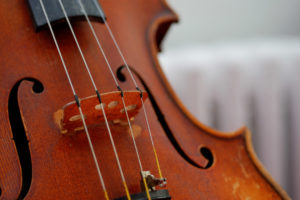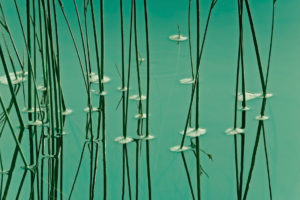This article originally appeared on UWBadgers.com and features Chad McGehee, former Learning and Program Development Manager from Healthy Minds Innovations and Center for Healthy Minds collaborator. McGehee is Director of Meditation Training with UW Athletics.
It wasn't her intention, but Dana Rettke caused quite a stir during a recent Zoom call.
Members of the Student-Athlete Advisory Committee at Wisconsin were comparing notes with their Big Ten Conference counterparts from Purdue when Rettke, a senior SAAC representative and one of the best collegiate volleyball players in the world, introduced a topic that triggered a flurry of curiosity.
The participants had broken up into smaller discussion groups, ostensibly to compare notes on COVID-19 protocols and other shared issues among student-athletes these days, when Rettke brought up mindfulness training. There was an immediate buzz.
"They were super curious about it," she said.
Rettke, the reigning Big Ten Female Athlete of the Year and three-time first-team All-America middle blocker for the Badgers, had a lot to share.
Wisconsin is the first — and so far, only — school in the country with a full-time meditation specialist dedicated to its athletic department, a move that was made nearly a year ago, before the pandemic began to take hold in the United States.
Chad McGehee is an engaging, soft-spoken 40-year-old — a former college soccer player, traveler of the world and K-12 school teacher — whose mindfulness specialty is working with those in high-stress environments like first responders, soldiers and, yes, student-athletes.
A growing list of UW Athletic Department administrators, like deputy director Chris McIntosh; coaches, like head football strength and conditioning coach Ross Kolodziej; and student-athletes, like Rettke; believe the world of meditation — the ancient practice of gently training the mind to be your greatest ally — may be the next big frontier in college athletics.
Rettke thinks her peers in the other 22 sports programs at UW have been presented with a unique opportunity that will not only enhance their experience in competition, but in their academic and everyday lives as well.
"This is such an up-and-coming field," she said. "Not a lot of people know about it. Not a lot of people know the benefits of it. Not a lot of people know what it means.
"If people knew more about it, it would be a huge hit. It's going to spread like wildfire once people really understand the benefits it could have for athletes."
"It's as much or more of a life skill that our student-athletes and staff will take with them as it is about the benefits that it will give to our student-athletes in competition."
Rettke, a strong candidate to play for Team USA in the Summer Olympic Games in Tokyo, Japan, next year, said she became acquainted with the benefits of mindfulness training while touring with the U.S. National Team last year because it has a meditation specialist of its own. She understands that the buy-in may never be 100 percent on a given team much less a given school, but that's okay because she knows what she knows about the mental side of her life.
"It just kind of helps to keep things in perspective," she said of McGehee and his teachings. "Sometimes in the world of athletics we get so wound up in our little sport bubble. I'm a player that if I'm wound up in that area for too long, I would just explode. It's definitely a high-stress environment. You almost feel like it's a ride-or-die kind of thing. You play, you win, you lose. It can be really hard mentally.
"He's helped so much keeping things in perspective. Life is so much more than volleyball. I think it helps me to be a better player."
Rettke told her peers at Purdue that mindfulness training should be seen as a gift.
"It's something we're grateful for at Wisconsin that we have that opportunity and we can dive into that aspect of our game," she said. "It's so awesome that we can be part of a school that values us so much."
McIntosh, second-in-command to Barry Alvarez, the director of athletics, said McGehee has emerged as an emotional force not only for those recruited to compete for the Badgers, but all walks of the department based on feedback from McGehee's weekly Zoom sessions with staff members.
"It's as much or more of a life skill that our student-athletes and staff will take with them as it is about the benefits that it will give to our student-athletes in competition," McIntosh said.
"Maybe that puts us at a place that's a little ahead of the curve. I don't know. I haven't spent much time looking around. But I do know that he has the ability to teach all of us something that can be helpful, not just on the field, but in our lives."

McIntosh said UW Athletic Department officials were responding to a push from the Big Ten toward a greater emphasis on mental health and overall wellness for student-athletes when McGehee was hired as the full-time director of meditation training in March.
But McGehee's relationship with UW Athletics actually goes back to 2015. While working as a learning and program development manager for Healthy Minds Innovation, a non-profit spin-off from the University of Wisconsin's Center for Healthy Minds, he helped acclaimed neuroscientist Richard Davidson and former Badgers and NFL linebacker Chris Borland launch a pilot program for teaching mindfulness to more than a dozen former NFL players in the area. McIntosh and Kolodziej took part in the program. So did Montee Ball, Ron Dayne, Derek Engler and Tarek Saleh among others.
Borland, a meditation practitioner who famously gave up a promising pro career because of concerns over brain injury and treatment, said McGehee was "masterful" in his work during the eight-week-long NFL project and the two became fast friends.
What intrigued Borland about McGehee? His confidence and humility were two attractions.
"Truly confident people that are masters of their craft don't really need to tell anybody," Borland said. "Chad embodies the benefits of meditation practice more than folks that talk about it constantly."
"He's very skilled at what he does. Chad has a tremendous feel for reading the group, understanding what they need and then meeting people where they are."
"My driving question was 'Is it possible to train student-athletes and coaches in mediation?' I didn't know the answer to that. It could have been no."
Borland also liked McGehee's "one of the guys" persona.
"A real Midwest guy who played college sports, wears flannel and eats cheeseburgers watching his football," Borland said.
Positive reviews from McIntosh and Kolodziej following the eight-week program gave way to McGehee working with members of the UW football, men's basketball and volleyball teams. McGehee didn't hesitate when offered the opportunity to have a full-time role with the athletic department.
"Count me in," he said of his reaction. "My driving question was 'Is it possible to train student-athletes and coaches in mediation?' I didn't know the answer to that. It could have been no."
Turns out it wasn't.
 Chad McGehee, Wisconsin Director of Meditation Training, attends men's basketball weightlifting session and joins team in a post-session huddle. Photo courtesy UW Athletics
Chad McGehee, Wisconsin Director of Meditation Training, attends men's basketball weightlifting session and joins team in a post-session huddle. Photo courtesy UW AthleticsMcGehee grew up in Sycamore, Illinois, played soccer at Illinois Wesleyan and found meditation while securing a degree in Hispanic studies.
Two moments helped form his core.
The first came when he was 17. His father, Mike — his best friend and role model — died suddenly, leaving his youngest child and only son to figure things out.
"All this suffering just showed up in my life that was deep and piercing," Chad said. "I felt I had a choice. I could either run from it, hide from it or I could meet it directly. There was something in me that said if I meet it directly, it would be worth it."
McGehee later came across a research study that detailed how prison inmates responded to meditation training vs. more traditional approaches. In short, those embracing meditation retained its calming lessons and pursued clearer paths.
"A huge light bulb moment for me," he said. "For many of us, the mind is this largely untrained resource that impacts us every moment of the day. What would happen if we took the time to train our minds?"
McGehee spent a year of college studying in Spain and 18 months teaching in Ecuador after graduation from college. He returned to the states and began an eight-year stretch where he taught English as a Second Language to adults and kids in K-12 in Illinois and Wisconsin.
It was during this period that McGehee became immersed in meditation training. Believing that he was sitting on a gold mine of helpful insights, he began sharing his knowledge with his students — young and old — and felt an occupational nudge.
McGehee subsequently joined the Center for Healthy Minds, a research group at UW-Madison, and said he spent six "amazing" years honing his craft before joining UW Athletics on a full-time basis. McGehee is still affiliated with the Center for Healthy Minds allowing his work to be informed by the most recent scientific research on training the mind. Within Athletics, he works closely with other departments under the holistic wellness umbrella known as Forward360, especially clinical and sports psychology.
"This is what I was meant to do," he said.
McGehee said meditation has a reputation for being "a little woo-woo granola." Skeptics hear about it and their minds float to images of Tibetan monks, the smell of incense, the sounds of "ohm" and, perhaps, David Carradine in the old "Kung Fu" TV series.
"That's not who I am," McGehee said. "That's not what I teach. That's not how I show up."
Meditation is many things geared toward one objective: training the mind for performance and well-being. It's about being where your feet are. It's about cultivating the mind to have patience, trust and curiosity. It's about creating a calm, consistent approach to living moment to moment. It's about being relaxed and focused at the same time.
McGehee said his philosophy starts with this: "Not to tell people what to do or how it works, but to guide them to see it for themselves."
It might involve simple breathing techniques in moments of stress, whether it's on the football field, basketball court or classroom. It might constitute a "body scan" whereby the subject quietly hones in on various regions of the body to effect relaxed concentration. It could involve a psychological reset button like the one Rettke uses when she's stressed or frustrated on the volleyball court: She adjusts her ponytail.
The message, she said, "is that one bad thing is not going to lead to the next and you can control that in your mind."
"For many of us, the mind is this largely untrained resource that impacts us every moment of the day. What would happen if we took the time to train our minds?"
Rettke said UW volleyball coach Kelly Sheffield was "stoked" when McGehee began working with the team, but estimated that more than half her teammates were skeptics. She was not one.
"I'm going to try anything that has a benefit to me, no matter how small," Rettke said. "I'm open to try anything."
Garrett Groshek, the senior running back and co-captain of the football team, said a book entitled "Relax and Win" served to open his mind to what McGehee offered. The fact Kolodziej, UW coach Paul Chryst, running backs coach John Settle, former teammate Jonathan Taylor, former record-setting quarterback Russell Wilson and a host of current players were on board helped.
"No reason to be skeptical when you have people you trust introducing it to you," Groshek said. "At Wisconsin, it's all about buying in. I bought in right away.
"I thought it was something really important just because every play and every (repetition) matters, so you wouldn't want to waste one thinking about the last one."
Groshek said his mindfulness training has been highly beneficial this year given how it's unfolded. The coronavirus pandemic erased spring practice, delayed the start of the season, cut the number of games, forced the cancellation of multiple contests, caused frustrating health situations for him and his teammates and produced unflattering results. He said he's a better person for having embraced meditation.
"I've felt very calm and at peace," he said. "I feel like I've been in the moment to where I'm not worrying about yesterday or tomorrow.
McGehee has a style that's easy-going, but on task.
"Super cool" and "really relatable on different levels" are some of the ways Rettke described him.
"What immediately struck me about Chad was how affable and relatable and how grounded he was," Borland said.
What makes McGehee good at what he does?
"I think he cares, number one," Kolodziej said. "I think it's authentic in terms of his caring for the individuals he's working with. He's passionate about what he's doing. He's got an unbelievable intuition in terms of the group and reading where they're at and what they need."
Borland, a first-team All-American in 2013, said having someone like McGehee available when he played for the Badgers from '09 to '13 would have made a huge difference.
"It would have been tremendously helpful, not so much for inside the lines — though there are some techniques that can be helpful for performance — but more in terms of juggling a hectic schedule and also dealing with injuries," he said.
Kolodziej, a standout defensive tackle for the Badgers from 1997 to 2000, echoed that thought.
"It's a piece that would have helped me tremendously as a player, but its benefits don't stop there," he said. "These are skills that these players can take and carry through their life and that's something we hit on with the guys all the time. This will help you down the road."
Kolodziej, who played in the NFL from 2001 to '07, was a skeptic until he saw how McGehee went about his business during the symposium with other former pros.
"He was right on point, man," Kolodziej said. "He has an unbelievable sense and feel for where people are at."
What resonated with Kolodziej?
"As an athlete, being a good player and always looking for an edge to becoming great, the mind, to me, was always the limiting component," he said. "I think we do a great job developing everyone physically and their football IQ. Bringing somebody in to focus solely on training the mind, nobody really does that on a consistent basis."
Kolodziej said securing someone like McGehee was a "huge win" for the UW Athletic Department. "He's very valuable, no doubt."
McGehee doubts such an opportunity would have been available just five years ago. Now he's on the cutting edge.
"I want to be in the middle of it," he said. "That's the choice I made when I joined the athletic department. The hope is to be at the front of this evolution, taking the insights from modern science and ancient practices and applying them so that all of us know how to train our minds for well-being and performance."
-Andy Baggot






